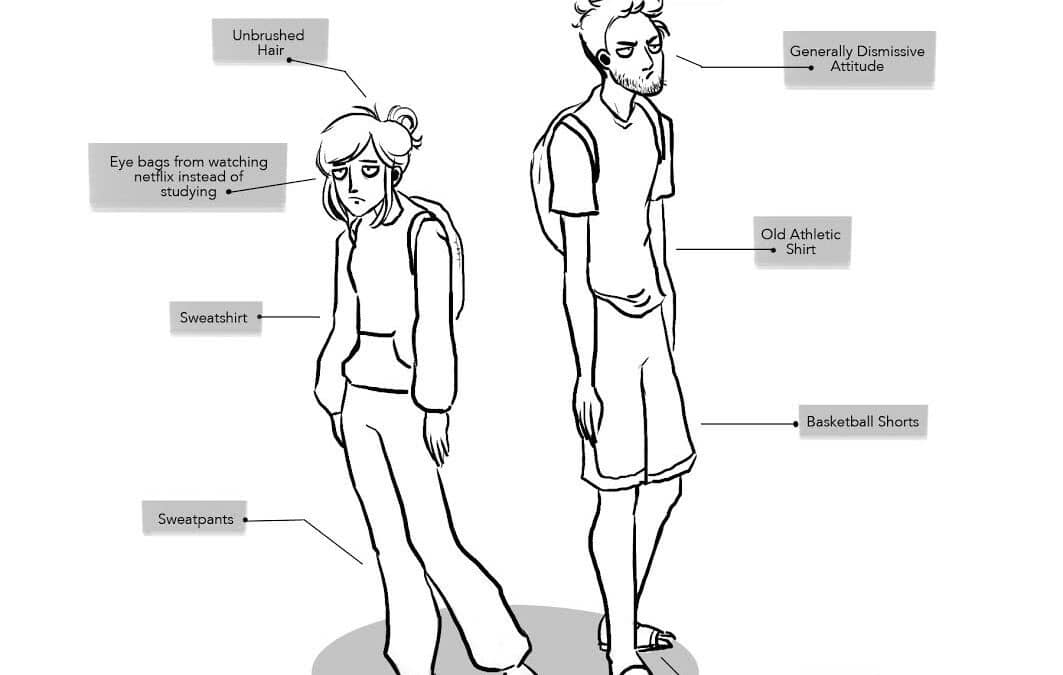Do you feel unmotivated, burnt out, or just plain done with school? If so, you might be experiencing a case of senioritis! It’s a common phenomenon that affects many students as they approach the end of their academic journey, and it can be a real challenge to deal with.
This blog post will take a closer look at senioritis, why it happens, and how you can overcome it to finish your final year strong.
What is senioritis?
Senioritis is a term that describes the decreased or lack of motivation and engagement affecting high school and college seniors, especially during their final school year or semester. Urban dictionary defines it as “a disease affecting mostly high school seniors.”
Students affected by senioritis may feel burnt out after years of studying and struggle to find the motivation to complete their coursework or prepare for graduation.
Symptoms of Senioritis
Senioritis can manifest in different ways for different students, but some common symptoms include laziness and the following:
- Decreased motivation: Students may have difficulty finding the energy or enthusiasm to complete assignments or study for exams.
- Procrastination: Students may delay or put off important tasks, leading to last-minute cramming or incomplete work.
- Decreased attendance: Students may skip classes or arrive late, either because they are not interested in the material or feeling burnt out.
- Lack of focus: Students may have trouble concentrating during class or while studying, leading to decreased productivity.
- Social withdrawal: Students may withdraw from extracurricular activities, social events, or friendships, either because they are feeling disengaged or because they are too busy with other things.
- Declining grades: Students may experience a drop in their grades or performance, either because they are not putting in as much effort or because they are struggling with the material.
- Feeling of “checked-out”: Students may feel “done” with high school or college and may be mentally preparing for the next phase of their lives.
It’s important to note that while senioritis is a common phenomenon among high school and college seniors, it can still negatively affect a student’s academic performance, mainly if it results in failing grades or incomplete assignments.
Admissions officers typically review a student’s final transcript, and any significant drop in grades could raise concerns about a student’s academic preparedness for college. In some cases, a college may even rescind an acceptance offer, put students on academic probation or even change their financial aid packages if a student’s grades drop significantly.
Colleges can refuse college admission to a student who has been accepted if their grades decline during their senior year. This is often stated explicitly in college acceptance letters.
Why this happens
There are several reasons why senioritis can happen to students. Here are some possible factors:
- Burnout: After years of studying and working hard, some students may feel burnt out and have trouble finding the motivation to continue putting in the same effort.
- Anticipation for change: As students approach graduation, they may be excited about the coming changes, such as going to college, starting a job, or traveling. This anticipation can make it challenging to stay focused on current coursework.
- Lack of challenge: For some students, the material covered in classes during their final year may not be as challenging or exciting as in previous years. This can make it difficult to stay motivated and engaged.
- Distractions: Senior year can be filled with social events, extracurricular activities, and college applications, all of which can distract from academic work.
- Feeling of accomplishment: Students near the end of their high school or college years may feel a sense of accomplishment and satisfaction with their achievements. This can lead to a feeling of being “done” with school and make it difficult to maintain the same level of motivation and effort.
To avoid the negative impact of senioritis on college applications, students should aim to maintain their academic focus and commitment throughout their senior year in high school.
Talking to a trusted teacher, counselor, or mentor can provide you with support and encouragement. Your teachers or counselors can offer advice on how to stay focused and motivated. Check our Educational Consulting and Academic Coaching Offerings.
What to Do After Your College Applications Are Submitted
Your current transcripts are sent to each school during the college admissions process.
This begs the question- do the grades students earn after they’ve already applied hold significance? As it turns out, yes! These grades matter, and knowing how they can impact your chances of acceptance is essential. It can be common for students to take their foot off the gas after submitting their applications, but there are several reasons seniors should strive to earn good grades.
After high school seniors submit their college applications, it’s essential not to let grades slip. For those applying via Early Decision or Early Action pathways, these grades can be an absolute deal-breaker for some colleges. With competitive universities especially, schools are always looking for ways to find the best applicants. First-quarter high school grades can set you apart from others in the application pool. When colleges receive large amounts of students applying, these grades can be used to filter out applicants. All schools have different requirements, so check if you must submit these grades.
If you are applying via ED or EA and the schools you’ve applied to don’t require your first-quarter senior year grades, they still may be worth sending in.
Since schools across the country are receiving higher volumes of applications than ever, not all colleges will follow up and request your current grades to help with the filtering process. Don’t leave any of your cards on the table! If your first quarter grades are strong, sending them in voluntarily can help you stand out. If students have earned all A’s, they should submit their grades to the colleges they have applied to. Submitting these grades, even merely by emailing your admissions officer at each college and letting them know your grades, also shows colleges you are confident in your academic abilities.
First-quarter and semester grades are significant for students applying with Regular Decision.
These grades are commonly requested when applying via Regular Decision and are submitted as a part of the mid-year report, which updates the college on your current GPA. Also included in this report are your course selections, so you can select classes that further your academic path and show universities you are open to challenging yourself. An end-of-the-year report is also commonly requested, allowing colleges to check that you can keep your grades consistent throughout the year. These grades may affect your place on waitlists or impact scholarship eligibility. Most scholarships require maintaining a minimum GPA, so senior-year grades must be prioritized.
After submitting your grades and applications, monitoring your application progress and ensuring that the school you’ve applied to has received all your information is essential.
Typically, schools will email a confirmation, but if you haven’t received notice within two to three weeks, follow up with the school to ensure they have everything they need from you. Some schools require an interview, and scheduling is often tied to these confirmation emails, so staying on top of your application’s progress is very important.
How to Deal with Senioritis
Here are some tips for dealing with senioritis, especially in high school:
- Set goals: Setting achievable goals, whether short or long-term, can help students feel a sense of accomplishment and can make it easier to stay motivated.
- Stay organized: Creating a study schedule or to-do list can help students stay on top of their assignments and deadlines, reducing stress and improving productivity.
- Stay engaged: Stay engaged in extracurricular activities or community service can provide a sense of purpose and help students maintain their focus and motivation. High school students can continue to take on a challenging course load, such as AP courses, which they can later earn credit for at many colleges.
- Stay focused on the future: Keeping the end goal, whether college, a job or travel, can provide students with a sense of purpose and motivation. Reminding oneself of the benefits of working hard can help students stay committed to their goals.
- Students need to take students to take breaks and engage in activities they enjoy, whether it’s spending time with friends, reading a book, or exercising. Taking time te can improve productivity and motivation.
- Stay positive: Maintaining a positive attitude and focusing on progress is crucial. Celebrating accomplishments and being kind to oneself can help combat negative feelings and maintain motivation.
Finally, seeking support from a trusted teacher, school counselor, or college advisor can help you stay on track and avoid the negative impact of senioritis on college applications. To schedule a consultation or for general questions, contact us here!
You can read more about senioritis here.

